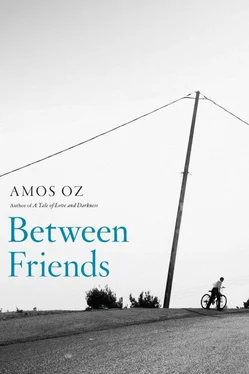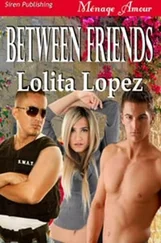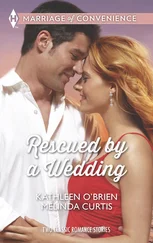He stood up and walked for another twenty minutes along the path that wound between the plowed fields until he was in the hills. For some reason, Yotam thought that here, in the hills, the heat would be less brutal than on the plains. But the thorns, the prickly cacti that grew along the side of the road, and the exposed rocks on the slopes seemed to smolder, and Yotam felt as if he were drowning in sweat. His throat was dry and rough, and his feet in their open sandals were rubbed raw by the mixture of sweat and sand.
At three in the afternoon, when the predatory sun was crushing the ruins and boiling the soil and the stones, Yotam reached the destroyed village of Deir Ajloun. He wandered around for forty minutes or so, ran his hands over the vestiges of the decapitated mosque, bent over to pick up a piece of earthenware that once had been the neck of a jar, passed a grindstone half buried in the ground. He wandered along paths strewn with pottery shards and thorns. A frightened lizard darted past his feet. And the smell of smoke hung in the air like an echo; it wasn’t clear to Yotam where that smell was coming from, perhaps from thorns burning somewhere in the distance. Finally he reached the blocked well with the faint stench of dead animals rising from its depths. Yotam sat down on the edge of the well and waited, though he didn’t know what he was waiting for or why. He heard the sounds of the kibbutz in the distance, strange, melancholy noises that seemed to come to him through a thick stone wall: a dull beating; the clang of metal against metal; the faint barking of dogs; the whirring of a raspy motor, maybe a tractor someone was having trouble starting; and also a person’s voice shouting and shouting beyond the distance and the blazing heat. He leaned over the well, saw only darkness, and thought he heard a steady, unbroken murmur, the soft whisper of a distant sea, the sound you hear when you put a seashell to your ear. For a moment, he imagined that he had already left the kibbutz and gone off to a new life, a life without committees, general meetings, public opinion, or the-fate-of-the-Jews. A moment later he thought of Nina Sirota and asked himself if she, like almost everyone else on the kibbutz, would have voted against him tonight. Then he answered his own question: neither Nina nor anyone else on the kibbutz had any reason to support his request, and if it had come from any of the other young people, he himself might have thought, What makes him so special? and would vote with the nays. It was clear to him now that the real issue wasn’t Arthur’s invitation but whether he had enough courage to leave the kibbutz, his mother, and his brother and go out into the world with only the shirt on his back. To that question he found no answer. Thorns and dry leaves stuck to his clothes and he stood up and brushed off his trousers and shirt. Then he began to walk, though what he wanted more than anything was to remain sitting there among the ruins of Deir Ajloun, on the edge of the blocked well, to sit there utterly still, his mind empty of thoughts, and to wait.
MARTIN VANDENBERG’S NEIGHBOR, Osnat, stopped by to see him one evening carrying a tray set with a plate covered with another plate and a cup covered with a saucer. Martin lived alone and had a respiratory condition, the result of years of smoking. In the afternoon, he would sit on his small porch and read the paper, occasionally breathing through a mask attached to an oxygen tank because his lungs were failing. He sometimes used the mask at night, too. Nonetheless, when he had the strength, he got up at six in the morning and went to work for three or four hours in the shoe repair shop. He was a firm believer in the principle that we must all devote ourselves to physical labor. “Work,” he said, “is a moral and spiritual necessity.”
“I’ve brought you something light from the dining hall. How about putting the paper down now and eating?”
“Thank you. I’m not hungry.”
“You have to eat. Just the omelet and the salad.”
“Maybe later.”
“Later the omelet’ll be cold and the salad’ll lose its crispness.”
“I’m getting cold and losing my crispness, too. Thank you, Osnat. Really. You don’t have to worry about me.”
“So who will?”
For several months now, ever since Boaz left her and moved in with Ariella Barash, Osnat had been living alone next door. Early every evening, she’d bring Martin supper on a tray because the uphill walk to the dining hall had become too difficult and left him short of breath. He had come to us, alone, from another kibbutz, where all the members were from Holland. He had left them over an ideological disagreement: they allowed Holocaust survivors to keep part of their German reparation money in private bank accounts, while Martin, also a survivor, thought that property was original sin, especially reparations from Germany, which amounted to blood money.
A stubborn, opinionated man, he was thin and had frizzy gray hair as stiff as steel wool, small eyes that were black and penetrating, thick eyebrows, sunken cheeks, and stooped shoulders. His breathing was loud and raspy from the emphysema. But, despite the disease, he occasionally smoked half a cigarette, wheezed, and refused to give in. He had taught Esperanto in Rotterdam when he was a young man, but since his arrival in Israel in 1949, he had no opportunity to use that remarkable language. The small Esperanto course he had wanted to give here on Kibbutz Yekhat never panned out. It was his belief that states should be abolished and replaced by an international, pacifist brotherhood that would reign after the borders between peoples were erased. When he came to us, he wanted to learn how to be a shoemaker, and not only did a fine job of repairing our shoes, but also made children’s shoes and sandals himself. Dr. Shoemaker, we called him.
On the kibbutz, he was considered a model of morality. At general meetings, he often reminded us of why the kibbutz movement was founded and what its original ideals had been. Nevertheless, there were those who thought him odd because in all the years he’d been with us, he never missed a single day of work. If he took sick and had to stay in bed for a day or two, he’d open the shoe repair shop on Saturdays to give the community back the time he’d missed. He believed that the entire world would wake up one day soon and abolish money altogether, since money was the root of all evil, a constant cause of war, conflict, and exploitation. On top of all this, he was also a vegetarian. Roni Shindlin, the comedian, called him the Gandhi of Kibbutz Yekhat. Two years ago, Roni came to our Purim costume party dressed up as Martin Vandenberg. He wore a white sheet and dragged a goat behind him with a sign in Esperanto hanging around its neck that said: I’m a person too.
Osnat said, “If you eat, I’ll stay with you for a while. And I’ll play two or three songs for you until you fall asleep.”
“I’m not hungry.”
“If you eat at least half the omelet, I’ll play you one song, and if you eat half the omelet and some yogurt, I’ll play you two, and if you eat the salad and the bread, too, you can give me a short lecture.”
“You can go. Go. There’s music outside, lots of young men, and there’s dancing. Go.”
But a moment later, he relented. “Okay. Okay. You win. I’ll eat a little. Here, see for yourself. I’m eating.”
Osnat had brought a simple recorder with her, the kind we give to young children, and as he ate, she played “On the Shore of Lake Kinneret” and “They Say There’s a Land.” Martin ate a few mouthfuls of the omelet and a little yogurt, grimaced, and didn’t touch the salad or the bread, but let Osnat help him sip some of the lukewarm tea from the cup she’d brought from the dining hall. On principle, he didn’t keep a private kettle or cups in his room: accumulating possessions is the curse of human society; it is the nature of possessions slowly to take over the soul and enslave it. Nor did Martin believe in the institution of family, because a family unit, by its very nature, creates an unnecessary barrier between itself and society. He believed that the community, not the biological parents, should raise the children: everything here belongs to all of us, we all belong to each other, and the children should belong to all of us, too.
Читать дальше












